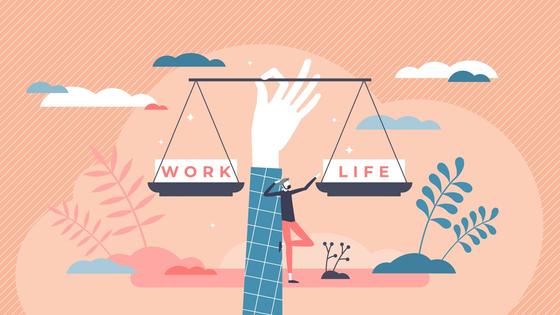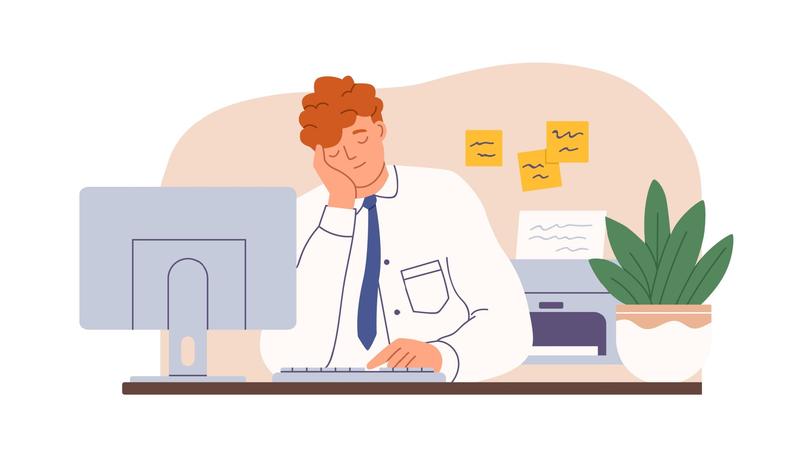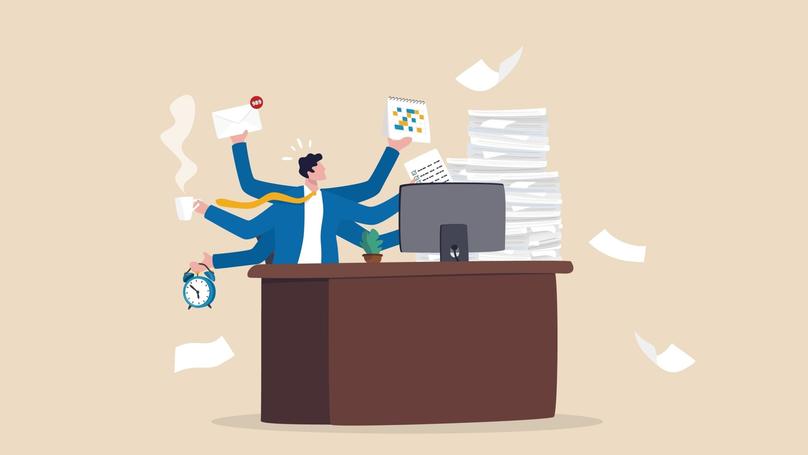Hitting the Ground Running: How to Smoothly Go Back to Work After a Holiday
Every employee looks forward to their annual holiday, but very few actually wish it would end.

Statistics show that when it comes time to return to work, 52% of specialists experience a phenomenon known as "post-holiday blues." This syndrome is known as a depressive episode, which can also include mood swings, anxiety, apathy, insomnia, and difficulty concentrating on work-related tasks. But if you go back to work properly, you can prevent all of this!
Typically, these post-holiday blues pass after 3-7 days at most. They do, however, contribute to stress and even conflicts at work because they are enough troublesome and at the very least depressing. Furthermore, this syndrome is more common in those whose jobs involve a lot of stress and accountability, like managers, doctors, teachers, emergency personnel, athletes, etc. The end of the holiday is usually not felt as keenly by those in more serene professions, such as museum staff. The first reason is that their daily lives do not drastically differ from those of holiday-makers, unlike, say, firemen or ambulance drivers, whose work and holidays differ greatly.
Perhaps you should consider switching careers entirely if your post-holiday blues are severe enough to paralyse you and your routine and last longer than a week. Since those who are made to work at a job they dislike typically suffer from prolonged and severe post-holiday blues. Naturally, no job can shield you from exhaustion and burnout entirely, but going back to your favourite work shouldn't make you cry or cause your knees to tremble. In any case, though, you can start by putting our tips on how to get back to work from your holiday as soon as possible into practice! There are eight of them.
Before you go on a holiday, get ready to return from it
Naturally, this advice only applies to you if you read it prior to your trip and not when you are about to return. But it's still important to keep in mind, if only for the future! Ultimately, putting in a full day's work on your final working day before you depart is the most efficient way to seamlessly transition from holiday mode to work!
Make every effort to finish the tasks that call for your involvement as much as you can, and prepare the ones that you will have to assign to colleagues. Write a sort of FAQ about the project beforehand, for instance, so that your colleagues can refer to it in your absence. Along with helping you fully relax and de-stress, this will save you from urgent calls and text messages.
Make sure your desk is organised. Arrange documents, place those that other staff members might require in a designated area, and, if necessary, either open or restrict access to the computer (if there is a risk of losing data). This will also enable you to come back to work right away to a spotlessly organised workspace free of needless clutter and rubbish. Furthermore, you should make a plan for the first two to three workdays after returning from your holiday so that you don't forget during your two weeks off what needs to be checked right away, what projects you have pending, who needs to hear from you, etc.
Note! While on holiday, try your hardest to avoid thinking about work; otherwise, it won't feel like a break and you might not have enough time to recover. While on a getaway, log out of work accounts, disable notifications, use a different phone, and avoid checking your email. If you're still concerned about potential emergencies while you're away, designate a single backup channel of communication for yourself and your chosen colleagues.
Don't disrupt your routine too much

And if you did, try to go back to it in advance. Naturally, we're referring to sleep patterns, which a lot of people alter as soon as they go on holiday. For instance, they go to bed later than midnight and wake up at noon rather than seven in the morning. It makes sense that the body would want to restore resources, get a good night's sleep, and alter its internal and external environments. Nonetheless, establish unbreakable boundaries for yourself beforehand, as it will be challenging to go back on them (this also adds to your stress). Don't go to bed later than a specific time, for instance, or gradually start waking up earlier again three to four days prior to the end of your time-off.
By the way, you can do something similar with daily routines. For example, cut back on sports and physical activity but don't completely give them up. Alternatively, continue to keep an eye on your diet while at the resort; just broaden it while maintaining a healthy foundation.
Return from your holiday on Thursday
This is essentially a life hack which can only be done with the manager's permission. But it's still one! Most people typically take a holiday starting Monday and return on the same day. However, knowing that your time-off will begin on Thursday rather than Saturday will make working easier and more enjoyable for you. And since there are just two working days left before the next weekend, it will be even simpler to return!
So, Thursday will be your "warm-up" day when you make plans, organise your backlog of work, and say hello to colleagues. On Friday, most people have a shorter workday, or at the very least, it's not customary to start new projects or tackle anything drastically different. The weekend will feel like an extension of your recently concluded holiday, allowing you to recuperate completely, organise your thoughts, process the impressions received, and schedule a full work week. In this scenario, Monday won't feel like a catastrophe as much, and you'll quickly fall back into your old routine.
Practice time management
In the event of a work overload, time management is invaluable. And when you're coming back from holiday, too! We especially suggest using the Eisenhower matrix, which was designed specifically for those situations where you have too much on your plate (which frequently occurs after a prolonged break) and don't know where to start. The matrix is easy to use: just list everything you have to do right now and sort it into four categories:
-
Urgent and important,
-
Urgent but not important,
-
Important but not urgent,
-
Not urgent and not important.
You should prioritize completing the urgent and important tasks in the first category first because you can't risk being late with them. Since they often don't require much time, the second category of tasks-urgent and unimportant ones, such as document signing or confirmation-should be scheduled for the end of the workday or in between urgent and important tasks. The third category of tasks, which are important but not urgent, ought to wait until after you've "unloaded" and are firmly back in your routine. You should fully assign the fourth category-non-urgent and unimportant-to your coworkers or interns.
Note! When you complete a task, put a check mark next to it rather than erasing or crossing it out. Seeing a list of jobs you've finished successfully inspires you and makes it evident how productive your day was.
Confront the fear of the unknown

Fear of going back to work because of potential changes at work is a common cause of post-holiday blues. You might therefore begin to shudder even while on holiday as you think about the day it will end. But let's be honest: in two weeks, the company usually hasn't had time to implement any innovations, and when you return, everything is exactly the same as it was when you left. This happens 98% of the time. Furthermore, even in the event that things have changed, you probably could adapt to them. Avoid picturing the changes and their effects on yourself. Although this kind of worry is meant to protect us by planning for every scenario that might arise, in practice it only drains resources because these possibilities are never realised.
Here's what to do if you find that your fear of the unknown, also known as intolerance of uncertainty, is truly a problem that you are unable to overcome on your own: a few days prior to your return, get in touch with a friendly coworker and inquire about any recent developments. That way, you can make sure you arrive at work prepared and stay current on news.
Turn going back to work into a celebration
Who said returning to work had to be such a tragic event? Ultimately, this isn't your last trip, and you most likely returned with a ton of mementos, local delicacies and souvenirs! Set some aside ahead of time for your coworkers, and plan a small tea party or give symbolic gifts to your coworkers when you return. Talk to your team about your trip; share with them the exciting moments, feelings, and humorous incidents. This can be done before work or during lunch, which will allow you to ensure a positive atmosphere for yourself and your coworkers while also allowing the hectic work pace to slow down for a day.
Your appearance can also contribute to a celebratory atmosphere. For instance, the sun has given you a beautiful tan. So wear something that will draw attention to your tan, something a little more revealing or white! Arrive at work wearing a gorgeous hairstyle, makeup, and accessories that you may have purchased while on holiday. Act as though this is an occasion you have been looking forward to for a very long time. In other words, set the mood for yourself. No one will be disappointed with this recipe, and you won't even need to pack mementos for it.
Note! However, if you need someone to talk to you about what's going on, souvenirs are a great way to get your coworkers to share information. For example, you might require assistance with a new task that has been assigned to you or a new project that has been launched while you were away.
Stop working overtime
When you return from your holiday, you may feel tempted to take on everything at once because there is so much to do! However, you're not yet prepared for that. It's unsettling enough that your workload has returned suddenly, let alone if it's already as heavy as it was before your time-off. Everyone needs a boost, time to adapt. You're only adding to the stress your body is already under by agreeing to work through the night to finish tasks or by tackling it all at once (even if this was your usual practice).
Take it easy on yourself. Even if you feel overburdened by the amount of work, keep it to a minimum for the first two to three days. Select three to four primary tasks and concentrate your efforts on them. Make sure to enjoy the first few evenings! For instance, reading your favourite book, going through your phone, or enjoying a film with popcorn. This way, your holiday doesn't end abruptly-instead, it ends gradually as you work during the day and continue to rest during the evenings!
Lectera’s Online Courses by topic
The first back-to-normal day's action plan

We've done all of the planning for your first day back at work to spare you the worry and stress! Use our comprehensive action plan as soon as you arrive at your workplace.
Step 1. Deactivate out-of-office replies. When someone writes to your email while you're not around, they automatically receive these emails. Restoring all functional communication channels is the first step towards letting people know that you are back. This includes logging into work accounts, removing the "on holiday" status, and so on.
Step 2. Check your email. Start with the channels through which your most important partners interact with you (e.g. email). There's probably chaos there. Start by skimming the email subject lines to identify which ones are the most crucial (they may correlate with that "urgent and important" category from the matrix). Respond only to those, and notify the rest of the people who are also important but don't have urgent questions that you'll get back to them as soon as possible.
Note! Never read emails in chronological order and all at once! Otherwise, you run the risk of becoming overwhelmed by them and giving up. Save time by organising emails and texts in a different, more efficient manner that will let you determine their urgency or importance.
Step 3. Make sure to check your calendar. Are you scheduled for any meetings soon? Do you have any deadlines that you need to meet? Are there any upcoming work events, conferences, or meetings? If they are today or tomorrow, get ready for them first.
Step 4. Create a strategy using the Eisenhower matrix and the previously mentioned points. You were able to gather detailed information about who expects what from you and when thanks to the preceding points. Prioritising the resulting tasks and moving forward with their implementation is now crucial.
Step 5. Eliminate distractions (if you come across any along the way). It's common to find it difficult to concentrate on work after a holiday. Put your phone away, avoid opening apps you don't need right now, tell your coworkers not to ask you about your holiday until lunch, and so on. You will undoubtedly be tempted to do interesting things like change your desktop wallpaper, show your colleagues a picture, or start counting down the days until your next holiday. But, wait until the evening and dedicate a specific time for them.
Step 6. Avoid overworking yourself and make time for some quiet time in the evening. After your first workday, treat yourself to something, like a nice meal, a well-made purchase, or your favourite at-home pastime, like video games or drawing.
No matter how long you've been off from work or how much work has piled up, increase your workload gradually to avoid depleting all of your restored resources before it's time for another holiday. Avoid overly ambitious plans, attempting to handle multiple tasks simultaneously, hurrying, and punishing yourself for being slow or absent-minded. Take it slow the first few days, take part in what needs to be done, but don't take on more than you can handle and, above all, schedule your tasks. And remember the next time, plan ahead for your holiday!
Share this with your friends via:
Latest News

A significant stage in the development of the alternative education system has begun in West Northamptonshire in the UK: the County Council is actively calling on parents, guardians, and trustees to participate in shaping the future of this key area.

Outwoods Primary School in Atherstone, Warwickshire, having experienced deep sadness after the loss of their famous cat, Silla, has found solace in a new pet – a Maine Coon named Aloysius O’Hara.

In modern universities, artificial intelligence, and in particular ChatGPT, is rapidly transforming from a controversial tool into a full-fledged student assistant.

An innovative educational project is gaining momentum in UK primary schools, aiming to change attitudes towards video games.

The Massachusetts Institute of Technology (MIT) presents MIT Learn – a revolutionary online platform that opens a “new front door” to access university knowledge and resources.












 Test: How Psychologically Mature Are You? Check Your Inner Foundation.
Test: How Psychologically Mature Are You? Check Your Inner Foundation.
 Test. Check Your Social Media Dependency Level!
Test. Check Your Social Media Dependency Level!
 Test: What Business is Right For You?
Test: What Business is Right For You?
 Test: How Prone Are You to Abusive Behavior as a Manager?
Test: How Prone Are You to Abusive Behavior as a Manager?
 Test. What superpower would you possess if you were a superhero?
Test. What superpower would you possess if you were a superhero?
 Test. What Should You Let Go of Before Winter Ends?
Test. What Should You Let Go of Before Winter Ends?
